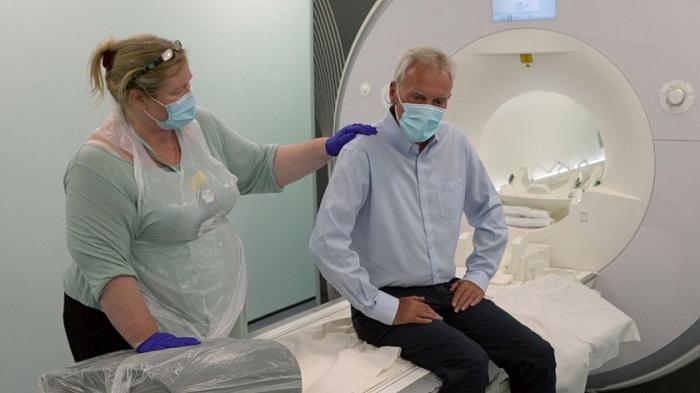Addenbrooke’s patient Dennis Clark has become one of the first people in the country to take part in a new trial which uses Artificial Intelligence (AI) to help diagnose and treat Alzheimer’s disease.
Before lockdown, the 75-year-old retired sales director had been enjoying his retirement with wife Penny, going on holiday and walking his two dogs. But Penny soon noticed he was starting to forget things. “If I asked him to do something, he would do the opposite. Then when we went out for a meal – which we didn’t do for a long time because of lockdown - he couldn’t remember how to pay for anything.”
Penny decided to call the GP for help when Dennis, who had always taken pride in his appearance, started to wear the same clothes over and over again.
“The GP did a quick test over the phone and said Dennis needed to be referred. I had heard Addenbrooke’s had a very comprehensive memory unit, so I was really pleased that we were able to be referred there.
“We had an initial consultation and we were asked if we wanted to go down the research route, which I was really keen for Dennis to do because it doesn’t just help him, it helps others as well.”
Dennis was referred onto the QMIN-MC trial which uses a machine learning algorithm developed by Prof Zoe Kourtzi, research lead at the Alan Turing Institute. The algorithm trains itself to diagnose patients by looking at MRI brain scans to identify patterns. It then combines these findings with the results of standard memory tests.
Addenbrooke’s consultant and clinical lead for the trial, Dr Timothy Rittman, explained: “Traditionally, when we look at patient scans we are looking for patterns to be able to help us exclude things like strokes and brain tumours. The computer can do this much more comprehensively than any human, helping to give us not only a more accurate diagnosis, but also a prognosis as well. With a better prognosis we can identify how quickly a patient is moving away from the normal pattern of the disease and amend their treatment and care accordingly.”
Diagnosing Alzheimer’s disease and dementia can take many months. It typically requires two or three hospital visits and can involve a range of CT, PET and MRI scans as well as invasive lumber punctures.
Doctors now hope AI can be used to provide a one-stop diagnosis. This will enable patients to begin treatment to reduce the effects of the disease more quickly and give families and friends more time to put preparations in place for the longer term.
To date around 80 patients have taken part in trial which was run by Cambridge University Hospitals (CUH), Cambridgeshire and Peterborough NHS Foundation Trust and two NHS trusts in Brighton.
Dennis underwent an MRI scan on 21 July and later that same day he and Penny received the news that his results were consistent with early onset of Alzheimer’s disease. In the meantime Dennis will begin taking medication to help treat the symptoms of Alzheimer’s disease.
"We are very grateful to Addenbrooke’s and would recommend other people take up trials as well. Quicker diagnosis means Dennis will be able to start medication that will hopefully delay his disease. It also means we can plan for the future and start to accept what is happening," said Penny Clark.
She added: "Fortunately Dennis doesn’t really understand the seriousness of it and is just trying to get on with life. We are hoping to get away again on holiday soon and still enjoy walking the dogs.”
If the results of the trial are positive the algorithm could be rolled out to thousands more patients across the country and has the potential to save the NHS half a billion pounds over the next five years.
To find out more read BBC science correspondent Pallab Ghosh’s report here: Artificial intelligence may diagnose dementia in a day
Image: Dennis Clark, about to undergo a brain scan
